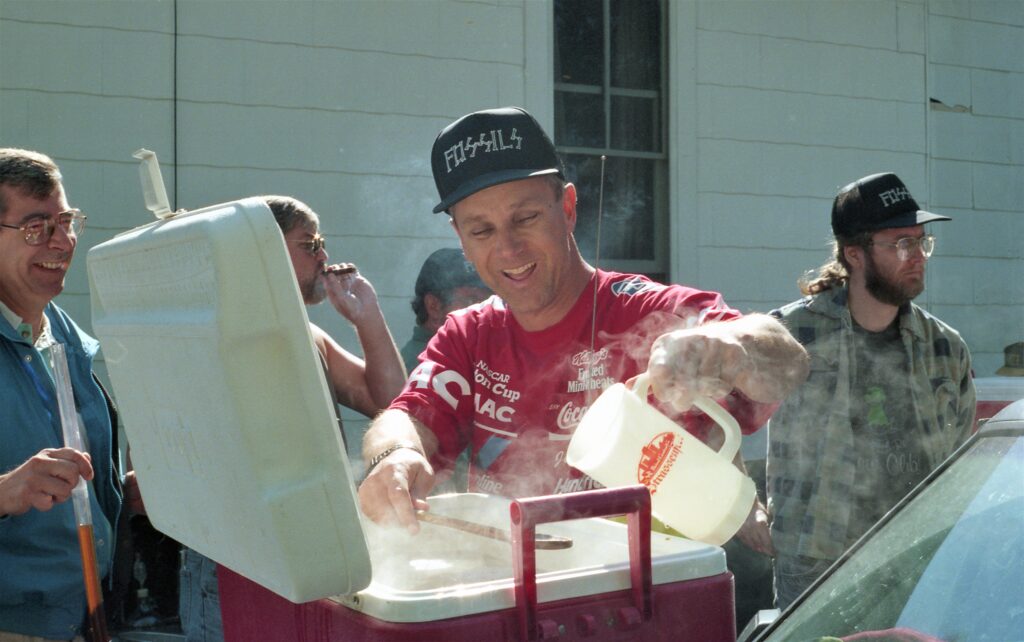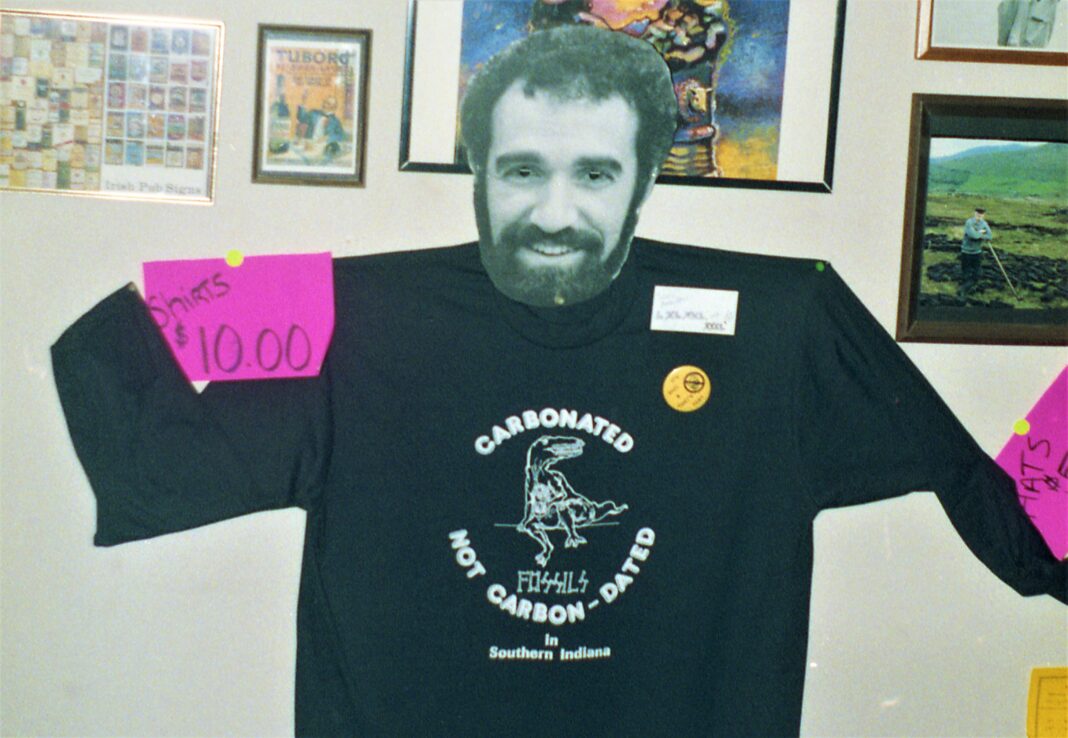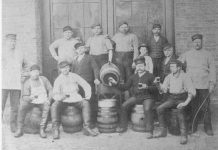
In September 1990, the Fermenters of Special Southern Indiana Libations Society (FOSSILS) homebrewing club was founded in New Albany. The Louisville Area Grain and Extract Research Society (LAGERS) was launched the previous year. Both remain going concerns, and yes, homebrewing is still a thing hereabouts.
In 1990, I was 30 years old and had been involved in one or the other aspect of the beer business for eight years. FOSSILS came into being at a time when the closest “microbreweries” to metropolitan Louisville were in Indianapolis (Indianapolis Brewing Company and Broad Ripple Brewpub) and Ft. Mitchell (Oldenberg). The Silo was two years away from inception, and Bluegrass Brewing Company three.
This year I’m celebrating 40 years in beer, and as time allows, digging into the files and sorting relics. Prior to 1997, few of my writings and random utterances were digitalized, but the following editorial proved salvageable, as published in Walking the Dog, the official newsletter of FOSSILS, in 1994.
Two months after I wrote these words, Michael “Beer Hunter” Jackson visited Louisville, a story previously told, and an event that seemed to vindicate the hard work of so many beer lovers during a period when we truly constituted a wild-eyed fringe element cursing the prevailing seas of swill. However, beyond mere polemics, I’m intrigued by the notion that even so long ago, and in spite of my own proclivities as a Europhile, we were aware of a specifically American “craft” beer to come.
It certainly did.
—
4th Anniversary Editorial: The Evolution of a New Tradition in America, by Roger A. Baylor, Editor of Walking the Dog
This issue of Walking the Dog, Number 49, marks the fourth anniversary of the establishment of the Fermenters of Special Southern Indiana Libations Society.
Taken as a whole, these 48 months have constituted a rich and satisfying chapter in my life, and looking back, I can see many aspects of our existence as a club that are worthy of examination. This month my observations will be confined to one specific theme that has developed over the years, which might be termed “beer culture” — the elements of beer and social customs that come together to form the basis of our shared beer drinking experience.
Often we have spoken, written and debated the meaning to be derived from the prevalent culture of drinking beer in other lands and other times. Perhaps the reference was to Munich, or maybe to Dublin. English pub culture has been examined, as has the cornucopia of choices awaiting the visitor to even the smallest of bars in Belgium.
Similarly, we’ve considered the “way it was” in America prior to Prohibition. A common occurrence in turn-of the-century Louisville might have been a small boy skipping off to the corner tavern for a growler of Kentucky Common, which would be carried home for consumption with the weekly Friday evening fare of boiled potatoes and pork sausages — recipes originating in Germany, from where the family in question hailed, recently or otherwise.
Microwaveable fettucine accompanied by Lite Ice just doesn’t have the same suggestion of deeper meaning as the preceding example.
Such topics — drinking according to the season in Bavaria, Guinness for strength in the Republic, the legendary pubs serving real ale in Yorkshire, and the Belgians merrily breaking the rules to create libations of awe-inspiring grandeur — are valuable and timeless. The FOSSILS experience has brought them to light for many of us, and we are better for it.
At the same time, it is possible that we are forgetting an important fact: Even as we study the classic beer-making and beer-consuming cultures, we are in the process of forging a new, distinctively American tradition, one that is growing and expanding beyond the wildest dreams of any of us less than five years ago, and one that if allowed to evolve without interference from the government or the megabrewers stands an excellent chance of justifying those elusive qualities of “Americanism” that are worthy, just and thought to be lost forever.
Consider the picnic held at Bob and Maureen Capshew’s on September 17. Where once the main attraction would have been a keg of Bud or Miller, mass-market products that have come to symbolize the darker, less savory side of the American “dream,” picnickers at the Capshews’ chose instead from a wide stylistic variety of beers, far more than are normally available at Dublin’s pubs or even many beer drinking venues in Munich.
To be sure, I will always love Dublin and Munich (to name just two), and if the opportunity to reside in either place arose, I would give it a shot. In a heartbeat. Also, there are numerous other aspects of life in America that neither exist in a place like Munich (drive-by shootings, willful illiteracy, institutionalized economic exploitation), nor can be alleviated in their virulent form here in the States by good beer alone.
Yet, we are building something in America that comes as close to achieving the “ideal” as anything any of us have experienced in any other endeavor. The positive notion of cultural diversity represented by the symbol of the “melting pot” can be seen in our enjoyment, espousal and embrace of beer styles and their origins, thus helping to negate the historic tendency of the melting pot to represent a blending of cultural diversity’s rich hues into a dull, gray, amorphous blob that, although sterile and indistinct, is sufficiently homogenous as a low common denominator to explain beers like Bud Dry and Miller Lite, the bastard children of a good idea (democratic opportunity) gone terribly sour through greed and stupidity.
The conclusion? To paraphrase John Lennon, progress is what happens to you while you’re busy making other plans. What began as an attempt to fathom, imitate and emulate the wonders of Munich, Dublin and even 19th-century Milwaukee continues to evolve into something far more, something indigenous and of our own making that curiously resembles the “can-do” American ideal that many of us cynically dismissed with derision for so many years.
It is an ethos that is on an unavoidable collision course with that espoused by America’s corpulent megabrewers, the authors and stewards of the American beer drinkers’ welfare state, in which the beer drinker numbly invites marketing wizards to define his or her beer-drinking existence by means of the saturation advertising of identical, vapid products, then warmly thanks these bloated corporations for their patriotic assistance in ingesting the small yet necessary doses of alcohol in a suitably flavorless, odorless manner.
One hundred years ago, the Busch clan emerged from the rice paddies of St. Louis and embarked upon the castration and degradation of the essence of beer as beer was meant to be. There are those who would dignify Anheuser-Busch’s incessant adulteration of the beverage that is its livelihood by associating the company with the “can-do” spirit of its founder, and if that is the case, then we are obliged to “un-do” the company’s work — by whatever means necessary.
In the realm of truth — the real thing, not what passes for truth in this huckster-friendly, pitch-addled and ad-happy nation of frantic consumers — Anheuser-Busch has already lost the battle. The trick now is to find a bulldozer big enough to push its rotting corpse into a sufficiently large hole.
If the past four years are any indication of what the future holds, we’ll find it.




















 Roger Baylor is an educator, entrepreneur and innovator with 40 years of hands-on experience and expertise as a beer seller, restaurateur and commentator. As the co-founder of New Albany’s Sportstime Pizza/Rich O’s Public House (which later became New Albanian Brewing Company) in the 1990s and early 2000s, Baylor played a seminal role in Louisville’s craft beer renaissance. Currently he is the beer director at Pints&union in New Albany and Common Haus Hall in Jeffersonville. Baylor’s “Hip Hops” columns on beer-related subjects have been a fixture in F&D since 2005, and he was named the magazine’s digital editor in 2019.
Roger Baylor is an educator, entrepreneur and innovator with 40 years of hands-on experience and expertise as a beer seller, restaurateur and commentator. As the co-founder of New Albany’s Sportstime Pizza/Rich O’s Public House (which later became New Albanian Brewing Company) in the 1990s and early 2000s, Baylor played a seminal role in Louisville’s craft beer renaissance. Currently he is the beer director at Pints&union in New Albany and Common Haus Hall in Jeffersonville. Baylor’s “Hip Hops” columns on beer-related subjects have been a fixture in F&D since 2005, and he was named the magazine’s digital editor in 2019.



